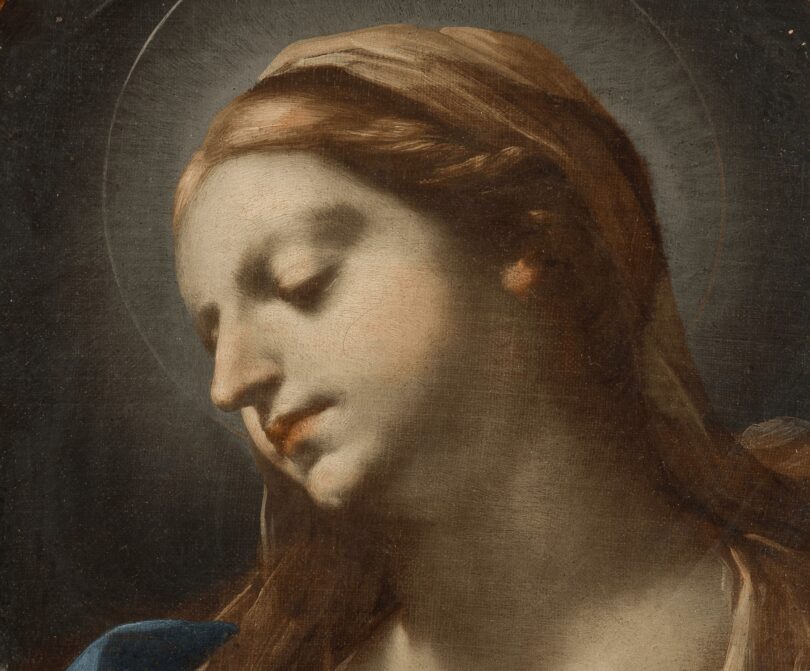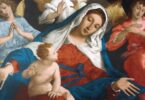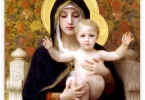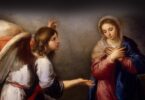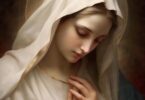Thomas Nguyen
Mary, the Galilean? (Lk 1:27)
What does it mean? (Lk 1:34)
The titles (Lk 1:28)
Dogmatic trace (CCC 966)
A. Mary, the Galilean
Annunciation came in the sixth month, after Elizabeth, Mary’s cousin, already found with child. Luke recorded. The Archangel Gabriel was sent by God to a geographic address, to meet with Mary, an individual virgin betrothed to a man named Joseph, of the House of David. The angel waited for no time, opening conversation, directly to his mission, greeting her with high encouraging word, ‘Rejoice, you who enjoy God’s favor.’ (Lk 1:28).
Angel continued, ‘The Lord is with you’ (.28). She was very confused with the greeting. She wondered what the meaning was. She was a little afraid. But the angel once more tried to comfort herself, telling her she gained God’s favor for the personal relationship with God and a special mission: ‘You are to conceive in your womb and bear a son, and you must name him Jesus. He will be great and will be called Son of the Most High.’ (.31-.32). The son shall be given the throne of ancestor David. The promise or plan was to put this son on top of leadership over the house of Jacob to no end. The child will be holy and will be called Son of God. (.33)
Accepting the mission was to risk the status of engagement with Joseph who actually planned, (caused by such happening) to quietly leaving her to the hand of the current law to apply on her, a young girl considered as outlawed, since she was pregnant out of the wedlock, a felony according to the contemporary law, she could face death penalty, stoned to death. But in dream Joseph was comforted by an angel who gave him a message from God asking him not to hesitate to accept her and complete their marriage since the embryo in her womb is the work of the Holy Spirit and the son to be called Jesus, ‘because he is the one to save his people from their sins.’(Mt 1:21). When Joseph woke up, he did as what angel told him to do. He took Mary, his wife home, whom he had not had intercourse with when she gave birth to a son, and he named the newborn baby Jesus.(.24-25)
Mary was a Galilean, born by Ana and Zachariah, a Jewish couple of town of Nazareth about 1st Century BC. She was the mother of Jesus, miraculously conceived and giving birth. The son will sit on the throne of David, his ancestor, and rule over the House of Jacob for ever; his reign will have no end. (Lk 1:32-33).
Mary’s motherhood was ostensibly confirmed at the Pentecostal Prayer at the Upper room where was Jesus’ Last Supper with his disciples before he entered suffering, being crucified and death. Luke recorded that after being through the excruciating experience of the great loss of their Master Jesus, whom his disciples believed as the one to come to deliver Israel from foreign occupation, the disciples left Mount of Olives and went back to Jerusalem, a short distance away, no more than Sabbath walk; and when they reached the city they went to the upper room where they were staying, Peter and John, eleven in all (no more Judas Iscariot), together with some women, including Mary the mother of Jesus, and with his brothers. (Acts 1:14).
Mary was proclaimed by Archangel Gabriel, ’Rejoice, you who enjoy God’s favor.’ (Lk 1:28). In Hail Mary ,”God’s favor” was translated into “full of grace” from Latin “gracia plena” (gratia = grace; plena = full) which means justifying grace was freely given Mary by the Most High God’s mercy in divine salvation plan for the world. Mary did not own or create but receive from our God of mercy. She herself loudly praised God for his love in “Magnificat”
” My soul proclaims the greatness of the Lord
And my spirit rejoices in God my Savior;
Because he has looked upon the humiliation of his servant,
Yes, from now outwards all generations will call me blessed,
For the Almighty has done great things for me.
Holy is his name,
And his faithful love extends age after age to those who fear him
He has used the power of his arm
He has routed the arrogant of heart
He has pulled down princes from their thrones and raised high the lowly
He has filled the starving with good things, sent the rich away empty
He has come to the help of Israel his servant, mindful of his faithful love.
According to the promise he made to our ancestors
Of his mercy to Abraham and to his descendants forever.”
(Lk 1:46-55)
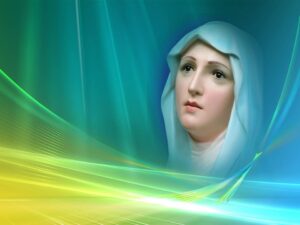
B- What GRACE did Mary receive? (Ps 104:1)
What grace has Mary received? There is title: ‘Our Lady of Grace’, since she is united in Christ Jesus, bearing Jesus in her womb, she lives in Jesus, and Jesus lives in her. She receives all graces that God abundantly may give her. But we may name a few so it may help us deepening reflection when citing Hail Mary or venerating Her with our docile and filial devotion with conviction of our faith in our Mother.
- To know God:(Mt 13:14)
Opening her praise to the Lord, Mary proclaimed and glorified the greatness of the Almighty. The greatest grace is to know, and to recognize God, the Omnipotent, without grace, human live in darkness, cannot recognize him to worship, but idolatry and so becoming immoral, boastful, arrogant, hateful, greedy, material and perilous as Jesus said, ‘This is the spirit that gives life, the flesh has nothing to offer.’ (Jn 6:63) And that God is spirit, and those worship must worship in spirit and truth.(Jn 4:24). Divine mind gives grace for human mind to see God, listen to his voice and be saved. Even Jesus gave plenty of parables, but the contemporaries did not comprehend as he said,
Listen and listen, but never understand!
Look and look, but never perceive!
This people’s heart has grown coarse,
Their ears dulled, they have shut their eyes tight
To avoid using their eyes to see, their ears to hear
Their heart to understand,
Changing their ways and being healed by me.’
(Mt.13:14-15; Is 6:9-10)
Since their eyes are blindfolded; ears, deaf and mind dull they cannot have ability to enjoy and taste the goodness of the Lord. As Hannah consecrated Samuel to Yahweh who granted what she asked for. Now she made him over to Yahweh, and they worshipped Yahweh and rejoiced and praised, ‘My heart exults in Yahweh, in my God is my strength lifted up, my mouth derides my foes, for I rejoice in your deliverance. There is no holy one like Yahweh, no Rock like our God.’ (1Sam 2:1-2; Is 61:10)
- To discern (Mt 23:7)
the difference between God, the Almighty and the human servitude, between the Creator and the created; between the life, living source and the given-life being, and so Mary exalted God, gracefully thanked him for looking upon the humiliation of his servant. Jesus rebuked the Pharisees, scribers, high priests, and the hypocrites. He said, ‘You must therefore do and observe what they tell you, but do not be guided by what they do, since they do not practice what they preach. They tie up heavy burdens and lay them on people’s shoulders, but they lift a finger to move them? ‘(Mt 23:3-5). What they do is to show off and to call for attention (.5-6) wearing broad-bands and longer tassels, like wanting to take the place of honor at banquets and front seats in the synagogues, being greeted respectfully in the market squares and having people call them Rabbi. (Mt 23:7)
Mary recognized the great Majesty of God as manifested generations ago, when Yahweh handed down his commandments to Moses for Israelites: ‘‘You will tear down their altars, smash their cultic stones and their sacred poles, for you will worship no other god, since Yahweh name is the Jealous One (Ex 34:14). Mary adored God, in prayer, ‘Bless Yahweh, my soul, Yahweh how great you are!’ (Ps 104:1), and she gratefully said thanks to God for looking upon her humiliation position as his servant. (Lk 1:48).
- Purity (Lk 1:4)
She concerned about her girlhood, a virgin according to the Mosaic Law. She questioned the angel when receiving the annunciation, she said, ‘But how can this come about, since I have no knowledge of man.’ (.34) Responding quickly to her that the Holy Spirit will come upon her, and the power of the Most High will cover her with its shadow. And so the child will be holy and will be called Son of God. (.35). The Holy Spirit and the Most High will work together in her whole being for the mystery of Incarnate-Jesus. She is united with the Trinitarian God Grace justificatively. She gave up herself for God’s mysterious work, with the short but uniquely, decisively and willfully entering the covenant with God: ‘You see before you the Lord’s servant. Let it happen to me as you have said.’ (Lk 1:38) She entrusted God and his plan. ‘Let it Father’s will be done’ as Jesus later taught the disciples to pray. (Mt 6:10)
She recognized the purity of heart and soul and she did not only see but was bearing him, Son of God in her womb, nourishing by her own milk, embracing him on her lap, living in him and him each and every minute in her life in the world, as Jesus proclaimed, ‘Blessed are the pure in heart: they shall see God.’ (Mt 5:8)
- Hungry and thirsty for Justification (Ps 107:9)
As previous generations and generations to come being hungry and thirsty for freedom from slavery of sins, and so for justification, God’s mercy, human always in thirst and hunger not for daily food on the table, but for rid of pain and suffering, and so perennial peace and happiness, longing for the One who is the Most High, Omnipotent, the Supreme whose love is abundant that can satisfy and fill the starving with good things (Lk.1:53; Ps 107:9). She saw how divine goodness is, as David praised,
They were wandering in the desert, in the wastelands
Could find no way to inhabited city;
They were hungry and thirsty
Their life was ebbing away.
They cried out to Yahweh in the distress,
He rescued them from their plight,
He set them on the road,
Straight them to the inhabited city,
Let them thank Yahweh for his faithful love,
For his wonders for the children of Adam!
He has fed the hungry to their hearts’ content,
Filled the starving with good things.
(Ps. 107:5-9)
- Fear God (Lk 1:30)
God loves anyone who fears him, humbly trusts him. He uses His omnipotent-power to supersede any and all other inferior, rival, rebellion. His power always overcomes any hostile forces, and he comes to protection of his loved-one who dedicates life and walk with him. Mary comes to know, and trusted in God who loves anyone who sincerely fears him and enters his refuge. She received God attribute and praised him,
His faithful love extends age after age those who fear him
He has used the power of his arm,
He has routed the arrogant heart. (Lk 1:50)
- United with the God of Mercy (Mt 5:6-7)
Mary united in God’s mercy. As Jesus in the proclamation of the Heavenly Beatitude, ‘Blessed are those who mourn: they shall be comforted. Blessed are the merciful, they shall have mercy shown them.’(Mt 5:6-7).At Cana, the wedding organizer ran out of wine to serve their guests. Mary and disciples were invited there, sympathized or empathized with the family, she asked her Son Jesus, and believed good things was to happen. Indeed, John recorded, ‘the president tasted the water, and it had turned into wine.’ (Jn 2:9)
- United in Jesus’ suffering (Jn 19:26)
Mary was in co-dependency with Jesus’ suffering on the cross. She, following Jesus on his Salvation itinerary, was there in the last minutes, and before the last breath from his physical life, she received the solemn mission to be mother of John, the beloved disciple, who represented humanity to accept Mary as the mother and take her home. (Jn 19:27)
- Touching human death-but immortality (Mt 27:59)
Mary was there by the cross, receiving Body of her Son, the flesh –body- and following to his burial at the tomb which was prepared and donated by Joseph of Arimathaea. (Mt 27:59) Mary understood the human destiny, born, living, dead, –living in Jesus, and let Jesus living in them, even dead and burial but not to be forever to bear corruption, suffering, calamity, pain, and abandon in the cold but in the glory of God if they allow the Spirit to generate them –then they have life, enslived as Jesus whom the Spirit raised to life freeing him from the pangs of Hades; for it was impossible for him to be held in its power since, as David says to him,
“For you will not abandon me to Hades,
Or allow your holy one to see corruption.
You have taught me the way of life,
You fill me with joy in your presence’ (Acts 2:27-28)
9. Receiving the Holy Spirit (Lk 1:35)
In Upper Room, eleven disciples with some women among them Mary, mother of Jesus were there, they with one heart, joined constantly in prayer (Acts 1:12-14). They united in mourning of the loss of Jesus. But Mary would have known what was going to have happened. Or she was in the Spirit at the beginning, receiving his work on her, in incarnation mystery.
On the Pentecost Day, all disciples and, brothers, sisters, gathered together and Mary supposed to be with them when suddenly, Luke narrated, There came from heaven, a sound as of violent wind, which filled the entire house which they were sitting; and there appeared to them tongues as of fire; these separated and came to rest on the head of each of them. They all filled with the Holy Spirit and began to speak different languages as the Spirit gave them power to express themselves.
This was the turning point, the Birthday of the Church of God, and from then on, no information or trace of where was being about Mary, Mother of Jesus. As she declared,
‘Yes, from now onwards all generations will call me blessed,
for the Almighty has done great things for me.
Holy is His name’
(Lk 1:48-49)
C- Titles (Lk 1:28)
Surely, generations after generations have praised her, as the great work by God’s hand creating the perfect gift, from divine mercy and so justification, God created Mary, the mother of Jesus and many other titles, as a few as follows: (Wikipedia) (CCC: Catholic Church Catechumen)
“Our Lady” is a common title to give to Mary as a sign of respect and honor. In French she is called “Notre Dame” and in Spanish she is “Nuestra Señora”.[8]
- Mary was identified as the “New Eve” as early as the later half of the Second Century. Justin Martyr(100–165) draws the connection in his Dialogue with Trypho. This idea is later expanded by Irenaeus.[9]
- John Chrysostom, in 345, was the first person to use the Marian title Mary Help of Christiansas a devotion to the Virgin Mary. Don Bosco promoted devotion to Mary under this title.
- Stella Marisor Our Lady, Star of the Sea is an ancient title for the Virgin Mary, used to emphasize her role as a sign of hope and a guiding star for Christians. It is attributed to Jerome and cited by Paschasius Radbertus.
| English | Latin | Greek | Notes |
| Mary | Maria | Mariam (Μαριάμ), Maria (Μαρία) | Arabic: Maryām, Coptic: Maria French: Marie, German: Maria, Italian: Maria, Judeo-Aramaic: Maryām Maltese: Marija, Russian: Marija(Мария), Spanish: María, Syriac: Mariam, Vietnamese: Maria |
| “Full of Grace”, “Blessed”, “Most Blessed” | Gratia plena, Beata, Beatissima | kecharitomene[10](κεχαριτωμένη) | from the angel’s greeting to Mary in Luke 1:28; |
| “Virgin”, “the Virgin” | Virgo | Parthenos[11][12](Παρθένος) | Greek parthenos used in Matthew 1:22; Ignatius of Antioch refers to Mary’s virginity and motherhood (ca. 110); |
| “Cause of our Salvation” | causa salutis[13] | according to Irenaeus of Lyons (150–202); | |
| “Mother of God” | Mater Dei | Meter Theou(Μήτηρ Θεοῦ) | often abbr. ΜΡ ΘΥ in Greek iconography; |
| “God-bearer” | Dei para, Dei genitrix | Theotokos(Θεοτόκος) | lit. “one who bears the One who is God”; a common title in Eastern Christianity with christological adopted officially during Council of Ephesus (431) in response to Nestorianism, which questioned the Church’s teaching that Jesus Christ’s nature was unified; |
| “Ever-virgin“ | semper virgo | aei-parthenos[11](ἀειπάρθενος) | |
| “Holy Mary”, “Saint Mary” | Sancta Maria | Hagia Maria[11](Ἁγία Μαρία) | Greek invocation is infrequent in contemporary Eastern Christianity;[14] |
| “Most Holy” | Sanctissima, tota Sancta[15] | Panagia(Παναγία) | |
| “Most Pure” | Purissima | ||
| “Immaculate” | Immaculata | akeratos[11](ἀκήρατος) | |
| “Lady”, “Mistress” | Domina | Despoina[11](Δέσποινα) | related, “Madonna” (Italian: Madonna, from ma “my” + donna “lady”; from Latin domina); also, “Notre Dame” (French: Notre Dame, lit. “Our Lady”); |
| “Queen of Heaven“ | Regina Coeli, Regina Caeli | Mary is identified with the figure in Revelation 12:1; |
D– Dogma (Lk 1:27)
There are four Catholic Marian Dogmas, the Church’s Doctrine about Mary, which are the highest degree of doctrines, dogmatic certainty based on the biblical revelation, following the course of historical, devotional, and the apostolic tradition in the Church through centuries. These doctrines have been specifically and extraordinarily defined as infallibly taught by a pope or Ecumenical Council, universal ‘Magisterium’ (=Charismatic, and Authoritative teaching of the Church) after a long process of study, discussion, and especially prayers before being promulgated as dogma which means the doctrine is defined from faith (De Fide Definita – or – De Fide Credenda = on the faith that must be believed).
These Four Dogmas about Mary are as followed:
Title Date The Substantial Content
Perpetual Virginity 3rd Century before bearing, at time, and after delivery (Lk 1:27.34) (CCC 499;510)
Mother of God Council of Ephesus Mary did not have same nature of the Word. (CCC 431)
Based on the greeting by her cousin Elizabeth, wife of Zachariah:
Why would I be honored with a visit from the mother of my Lord? (Lk 1:42)
Immaculate conception Pope Pius IX-1854 Mary justifiably kept by God from all stains of sins, and original sin (CCC 491)
Not from human stock or human desire, or human will but from God himself (Jn 1:13)
Assumption into Heaven Pope Pius XII (1950) The Assumption of Blessed Virgin is a singular participation in her Son’s
Resurrection (CCC 966) Anyone who believes me shall not die.( Jn 11:25-26)
By:Thomas Nguyen
Views: 0

